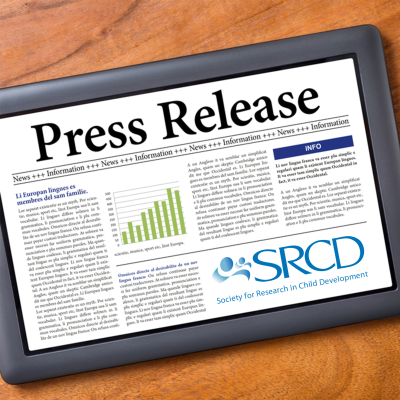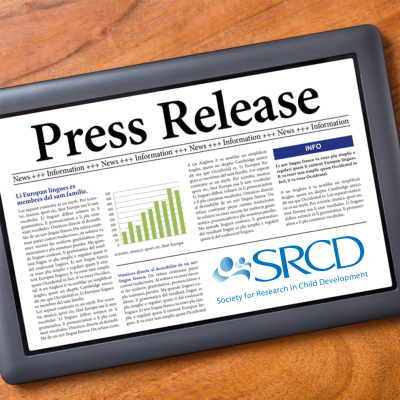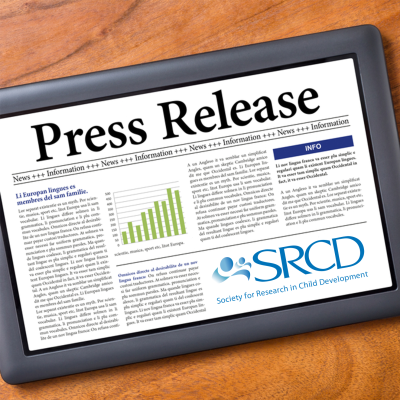Child Development Special Section: Advancing Scholarship on Anti-Racism within Developmental Science
MEDIA ALERT / CHILD DEVELOPMENT
WASHINGTON, D.C. - The deaths of George Floyd, Ahmaud Arbery, Breonna Taylor, and many others, amidst a global health pandemic, brought about a renewed call to action directed toward anti-racist research, policy, and practice. More recent events such as the racist shooting in Buffalo, New York further emphasize the need to help inform the development of anti-racism in children within and across contexts, and with attention to developmental stages. At the same time, there are few empirical studies on anti-racism constructs, and we know little about the development of anti-racism among diverse youth across key stages of development.
A special section of the journal Child Development, published by the Society for Research in Child Development (SRCD), sought to address this gap by highlighting scholarship in developmental science that attends to the development of anti-racism in children across contexts (e.g., families, schools) and developmental stages (e.g., early childhood through emerging adulthood).
“The articles featured in “Advancing Scholarship on Anti-racism within Developmental Science,” demonstrate the possibility for developmental science to address critical questions surrounding the development of, precursors to, and outcomes associated with anti-racism in youth,” said special section co-editor and Associate Professor of Psychology at the University of North Carolina at Chapel Hill, Shauna M. Cooper. “Although understanding the ways that racism impacts development and well-being remains an important line of inquiry, to truly advance anti-racism research, developmental science, as a field, must engage in critical self-reflection, committing to examination and reexamination of our theoretical foundations, our incorporation of interdisciplinary perspectives, our approaches to measurement and design, our contextual conceptualizations, and our approaches to intervention.”
Articles in this Special Section will be free-to-read for three months on the Wiley Online Library until the end of August 2022 and include:
- “How age and race affect the frequency, timing, and content of conversations about race with children” by Jessica Sullivan, Leigh Wilton and Evan P. Apfelbaum
- “Parent socialization and anti-racist ideology development in White youth: Do peer and parenting contexts matter?” by Ciara Smalls Glover, Fatima Varner and Kathleen Holloway
- “Maternal color-consciousness is related to more positive and less negative attitudes toward ethnic-racial outgroups in children in White Dutch families” by Judi Mesman, Ymke de Bruijn, Daudi van Veen, Fadime Pektas and Rosanneke A. G. Emmen
- “Antiracism defined as equitable sociocultural interactions in prekindergarten: Classroom racial composition makes a difference” by Stephanie M. Curenton, Shana E. Rochester, Jacqueline Sims, Nneka Ibekwe-Okafor, Iheoma U. Iruka, Arlene G. García-Miranda and Jessica Whittaker
- “Building a space to dream: Supporting indigenous children’s survivance through community-engaged social and emotional learning” by Jingjing Sun, Anisa N. Goforth, Lindsey M. Nichols, Amy Violante, Kelsey Christopher, Ronda Howlett, Debbie Hogenson and Niki Graham
- “Anti-racism activism among Black adolescents and emerging adults: Understanding the roles of racism and anticipatory racism-related stress” by Elan C. Hope, Vanessa V. Volpe, Alexis S. Briggs and G. Perusi Benson
- “Testing the effectiveness of the Developing Inclusive Youth program: A multisite randomized control trial” by Melanie Killen, Amanda R. Burkholder, Alexander P. D’Esterre, Riley N. Sims, Jacquelyn Glidden, Kathryn M. Yee, Katherine V. Luken Raz, Laura Elena, Michael T. Rizzo, Bonnie Woodward, Arvid Samuelson, Tracy M. Sweet, Laura M. Stapleton
For additional information, or interviews with authors, please contact SRCD Media Relations and Communications Manager, Jessica Efstathiou: jefstathiou@srcd.org, 202-800-3255.
The Society for Research in Child Development advances the developmental sciences and promotes the use of developmental research to improve human lives.


